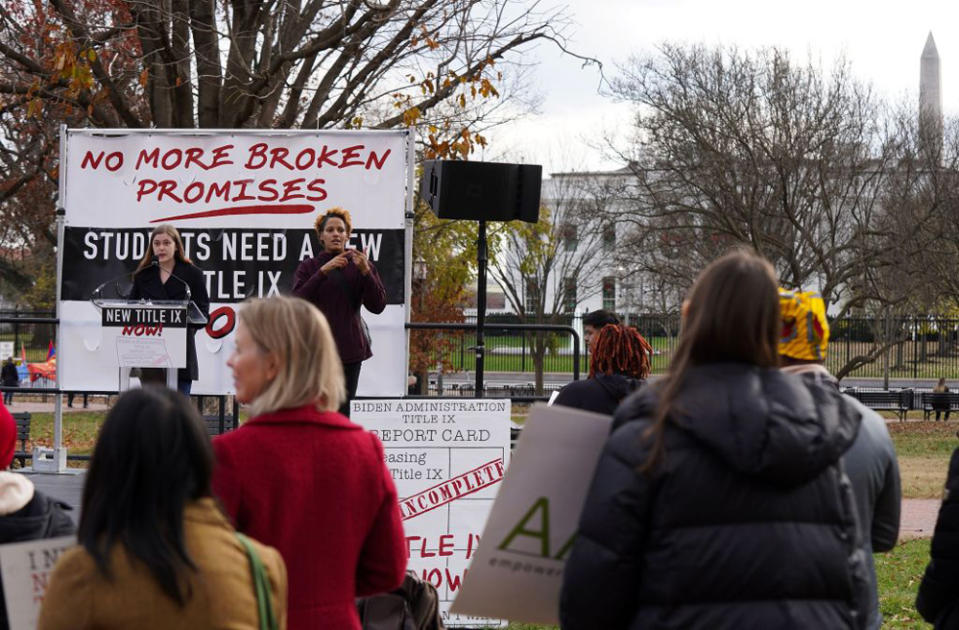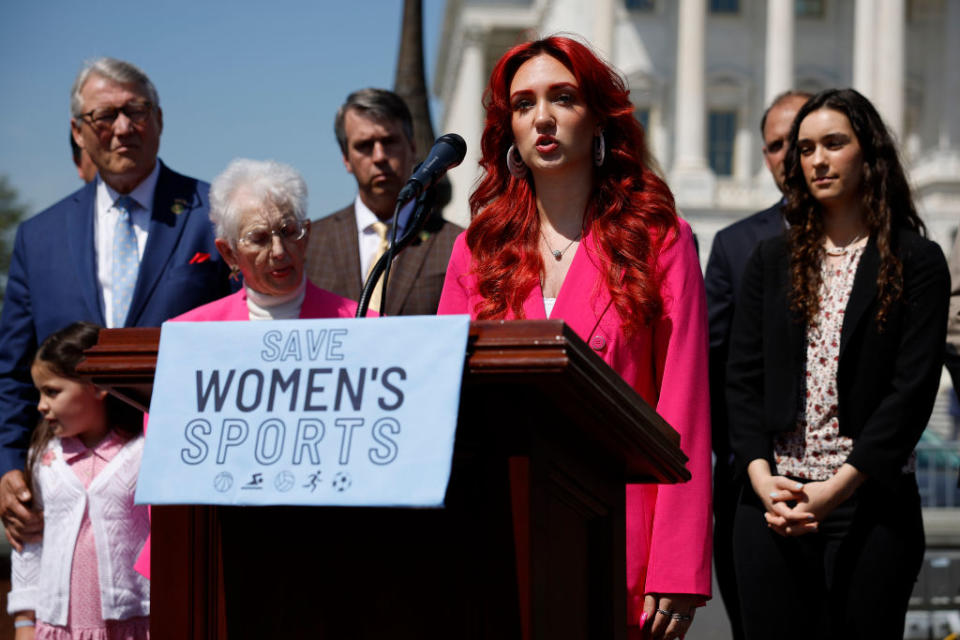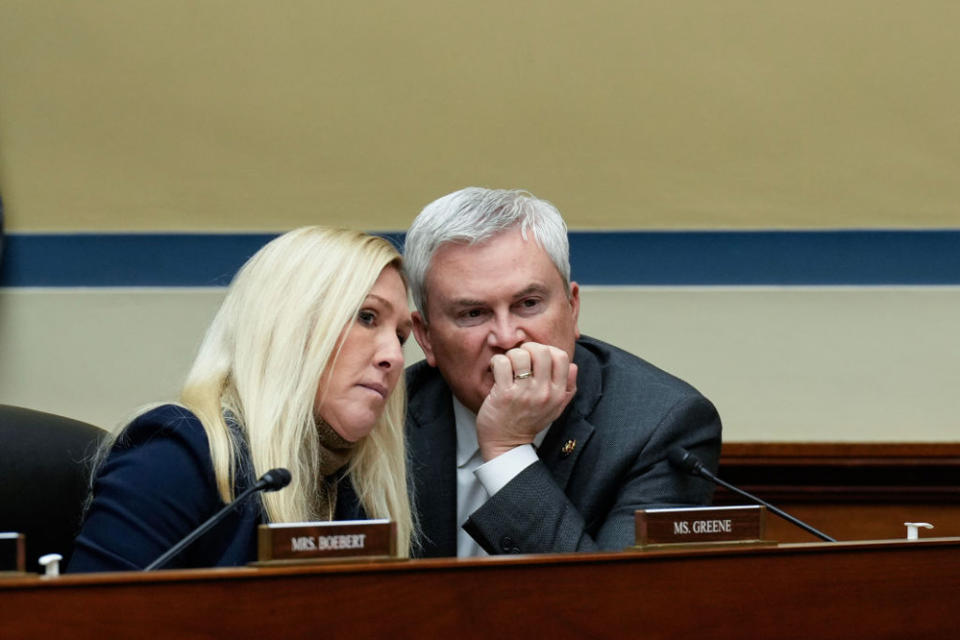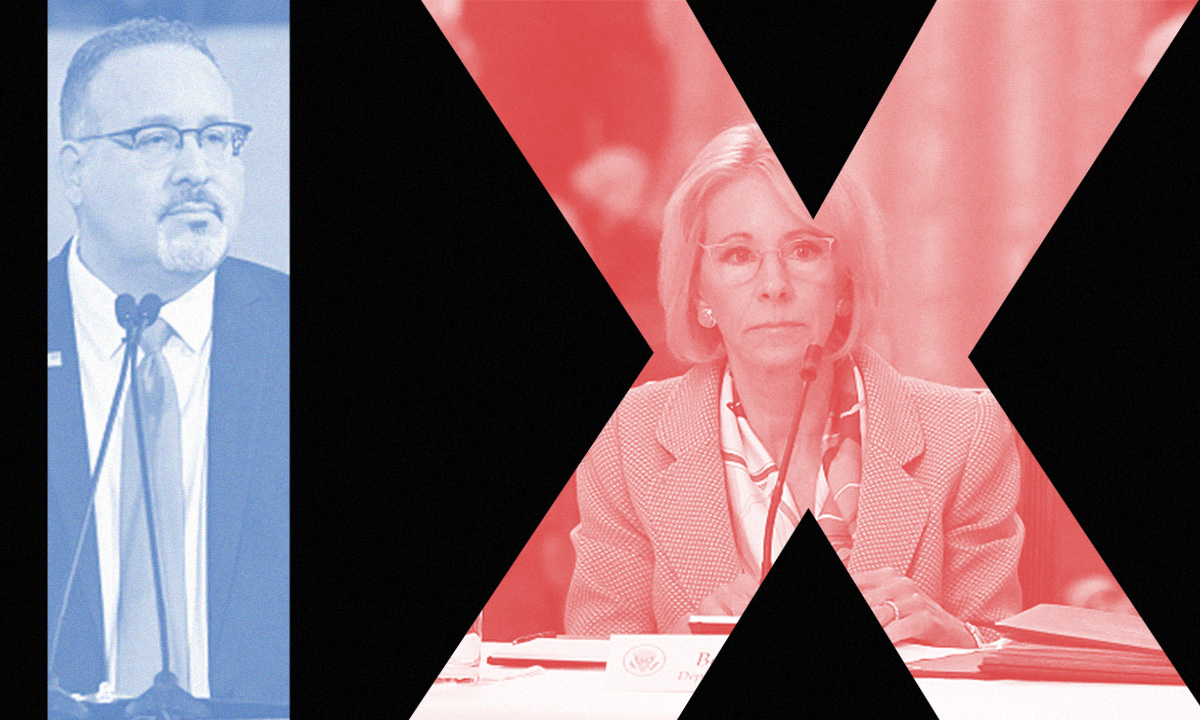The U.S. Department of Education on Friday restored protections for students against sexual harassment and assault that many advocates argued were lost under the previous administration.
The new Title IX rule, which goes into effect Aug. 1, requires districts to promptly investigate complaints, even if they occur off school grounds, and to extend those protections to LGBTQ students. Districts must also train school employees about their obligations to address sex discrimination.
Controversy Over Ed Dept. Title IX Overhaul Expected to Fuel Further Delays
”These regulations make crystal clear that everyone can access schools that are safe, welcoming and that respect their rights,” Education Secretary Miguel Cardona during a call with reporters. “Title IX’s prohibition of sex discrimination includes all forms of sex discrimination. No one should have to give up their dreams of attending or finishing school because they’re pregnant. No one should face bullying or discrimination just because of who they are or who they love.”
Get stories like these delivered straight to your inbox. Sign up for The 74 Newsletter
Left unresolved, however, is a second, and more controversial, rule that applies to transgender students’ participation in school sports, which some observers speculate the administration is pushing until after the election.
That did not dampen partisan objections to what they did include, which is expected to fuel a new wave of litigation. Republican Rep. Virginia Foxx, who chairs the House education committee, questioned the inclusion of transgender students under Title IX and said the rewrite rolls back protections for women.
“This final rule dumps kerosene on the already raging fire that is Democrats’ contemptuous culture war that aims to radically redefine sex and gender,” she said in a statement. “The rule also undermines existing due process rights, placing students and institutions in legal jeopardy and again undermining the protections Title IX is intended to provide.”
President Joe Biden pledged to overhaul Title IX even before he won the 2020 election, when he said a Supreme Court opinion that prevents discrimination against LGBTQ employees grants the same protections to students. But it took over two years for the department to release an initial draft outlining its new approach. A proposed rule concerning trans students’ participation in sports followed in early 2023, but has yet to be sent to the White House for final review.
Officials have attributed the delays on both rules to the hundreds of thousands of comments it received from the public. But there’s also been intense backlash from Republicans, who say allowing transgender women to compete on teams consistent with their gender identity upends the original goal of Title IX.
New Research Looks for Ways to Reduce Sexual Harassment and Assault in Schools
Advocates and Democrats in Congress argued the delay left victims at risk and discouraged some students from reporting incidents because they thought schools wouldn’t respond.

“For many students, a weakened Title IX harassment rule is all they’ve known through their college and high school experience,” said Shiwali Patel, a senior counsel at the National Women’s Law Center. “Extremist politicians have increasingly attacked the rights of LGBTQI+ students, especially, transgender, nonbinary, and intersex students, attempting to codify discrimination through legislation and other policies.”
On Friday, advocates cheered reaching what they view as an important milestone in the rule’s overhaul. Even so, many school districts might not be prepared to take the proactive approach the rewrite requires.
Women Who Fought for Title IX 50 Years Ago Divided Over Transgender Inclusion
“It’s jaw-dropping to see things are still lax and so backwards,” said Sanda Hodgin, founder and CEO of Title IX Consulting Group, a Los Angeles-based firm. Some districts, she said, have outdated policies or don’t inform students about how to file a grievance.
Districts will have to act fast, she said, to ensure they have a Title IX coordinator who is up to speed on the new requirements and can “help them navigate all of it.” She noted a recent investigation that found Liberty University, a Christian college, discouraged students from reporting sexual violence. “K-12 systems are going to be looking at things like that and hopefully say to themselves, ‘We don’t want to be that example.’ ”
In addition to requiring districts to promptly investigate any “sex-based hostile environment” in education programs both in and out of school, the revised rule also removes the requirement for live hearings with cross-examination for sexual misconduct investigations. Former Education Secretary Betsy DeVos added that provision to protect the due process rights of male students who argued they’d been unfairly accused of harassment or misconduct.
Catherine Lhamon, assistant secretary of education for civil rights, dismissively noted the 2020 rule required schools to be “no more than not deliberately indifferent” to harassment.
The Biden administration has expected districts to comply with its executive order applying Title IX protections to LGBTQ students even as Republican states filed litigation challenging its interpretation. Twenty-two states sued in 2022 over guidance from the U.S. Department of Agriculture, which oversees school nutrition, stating that programs receiving federal funds must follow civil rights laws or risk being reported to the Department of Justice.
Max Eden, a research fellow at the conservative American Enterprise Institute, said he expects “lawsuits from state attorneys general within days, or at longest, weeks.” Some, he said, will challenge the administration’s decision to extend Title IX’s protections to include gender identity. Others, he added, argue the rule could violate free speech if an offensive comment or a teacher’s refusal to use a preferred pronoun, for example, is perceived as discrimination. In a Thursday call with reporters, a senior administration official said if such a situation “limits or denies [a student’s] access to education,” the person’s behavior could be construed as creating a hostile environment.
But Sasha Buchert, a senior attorney for Lambda Legal, an LGBTQ advocacy organization, said fear of litigation shouldn’t prevent school officials from following the law.
“If I was their council, I would remind them that they’re on the wrong side of the law if they decide to discriminate against LGBTQ students,” she said. “If you want to protect your school against liability, the smart thing to do would be to not choose to discriminate.”
In a decision this week, a federal appeals court agreed with the Biden administration’s interpretation that Title IX protections for LGBTQ students can apply to athletics. The U.S. Court of Appeals for the Fourth Circuit blocked West Virginia’s law banning a trans student from playing on a team consistent with her gender identity.
The case focuses on Becky Pepper Jackson, a 13-year-old transgender girl and middle school track athlete, who has identified as a girl since third grade.
Last year, West Virginia Attorney General Patrick Morrissey asked the U.S. Supreme Court to allow the state’s Save Women’s Sports Act to go into effect, but the court put it on hold. Morrissey posted on X that he will also appeal the Fourth Circuit’s ruling.


In its Title IX draft for sports, the education department attempted to carve out a compromise, avoiding across-the-board inclusion for trans students on teams consistent with their gender identity. But it didn’t ban such policies outright. The draft states that schools and colleges could limit transgender students’ participation in specific sports — particularly at the more competitive high school and college levels. But in the elementary grades, and likely into middle school, most students would be able to play sports consistent with their gender identity.
Buchert said advocates hope the department will “issue a strong rule that provides clarity about where the department stands on those issues.”


Donald Trump, the Republican presidential nominee, has said he won’t “allow men in women’s sports.” If he wins, some observers expect him to rescind any attempt by the Biden administration to allow trans students to compete in sports consistent with their gender identity.
“We’re looking at a very polarized Title IX conversation,” Hodgin said.
